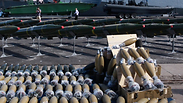
UNITED NATIONS - The United States and Britain on Thursday called for a UN investigation of Israel's claim that it intercepted an Iranian shipment of rockets headed for the Gaza Strip.
UN officials have said that if Israel's claims are true, Iran would be in violation of Security Council sanctions.
US deputy ambassador Rosemary DiCarlo urged the Security Council committee that monitors sanctions against Iran to investigate the incident. She said "the committee should be prepared to impose real consequences, such as possible sanctions designations on those responsible."
British Ambassador Mark Lyall Grant called for a similar investigation.
Related stories:
- IDF captures Iranian ship carrying advanced rockets for Gaza
- Inside Iran arms ship: 40 missiles, 400,000 bullets
- Iran weapons ship: Behind the scenes of IDF 'Operation Full Disclosure'
"This is not the first time that we have seen reports of potential arms transfers to Gaza involving Iran," Lyall Grant noted.
The envoys spoke after a council briefing on the sanctions committee's latest report.
The report said Iran had still not replied to inquiries last year on two other incidents: Iran's launches of Shahab 1 and 3 missiles and an intercepted arms shipment in Yemen.
Australia's UN Ambassador Gary Quinlan, who chairs the committee, said it continues to call on Iran to provide explanations.
Russian Ambassador Vitaly Churkin urged the committee to refrain from taking any actions that could compromise efforts by six world powers and Iran to reach an agreement on Tehran's nuclear program.
Churkin said "it is critically important that the committee and its panel of experts should operate in a very careful, balanced and objective way."
The Klos C was captured by the Israeli Navy earlier this month in open waters on the maritime border of Sudan and Eritrea, some 1,500 km south of Israel.
The vessel was sailing under a Panamanian flag, making its way to Sudan from Iran carrying a cargo of advanced rockets capable of reaching distances of up to 200 km.
The IDF found 40 M-302 long-range missiles, as well as 181 22-milimeter mortar shells and 400,000 7.62 bullets on board the ship.
The rockets originated in Syria, the IDF said, where Iran is known to store large arsenals. The rockets were flown from Syria to Iran, where they were loaded on the ship that then departed for Iraq where the arms were concealed in boxes of cement.
From the Iraqi port of Umm Qasr it sailed into the Red Sea around the Port of Oman, bound for Sudan. The ship's progress was closely tracked by the IDF as it sailed.
Iran has accused Israel of staging the Red Sea seizure to derail Tehran's improving relations with the West.
Displaying the rockets earlier this month, Israeli Prime Minister Benjamin Netanyahu accused the international community of falling victim to a charm offensive by the new leadership in Tehran.
Netanyahu has been highly critical of the US-backed efforts to negotiate a deal with Iran that would substantially scale back its nuclear program in exchange for ending international sanctions.
 |
Both DiCarlo and Lyall Grant emphasized that the world should continue to vigorously implement sanctions against Iran while negotiations continue.
Yoav Zitun contributed to this report.















